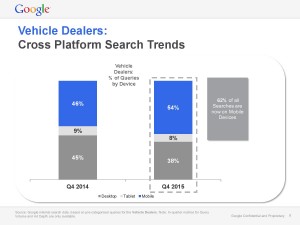Posted:
Friday, February 12, 2016
Tags:
Ads, AdWords, Google Technology, ppc, User Stats
Google Vehicle Dealer Report For Q4 2015
Google recently released their Vehicle Dealer vertical report for the Q4 of 2015. The data yielded some interesting data that shed some new light on the vertical and reinforced past trends. According to the report search queries in the Vehicle Dealers Category grew by 13%. Interestingly, Desktop searches declined by 3 percent and Tablet queries declined by 5 percent, while Mobile queries grew by 33%. This is not groundbreaking news, but it does reinforce the fact that mobile traffic is increasingly becoming a larger part of the pie.
The report also shed some light on interesting trends in regards to the paid search auctions on Google search results.

Queries, Impression and Clicks saw huge increases for Mobile on the Adwords search auction. On the contrary, those same metrics saw a decrease on desktop – no surprise there. An interesting trend that I wasn’t aware of was that Ad Depth decreased quite significantly for desktop queries, a drop of 8.79%. The Ad Depth refers to the number of ad placement spots for a particular search query. A near 10% drop in Ad Depth means that a search term that used to yield 10 search ad spots may only be showing 9 ad spots now. One less ad spot on the search results page means a decrease in impressions and a rise in CPC as the same number of advertisers competes for even less ad space. If your dealership Adwords campaign saw a rise in CPC in the past 3 months then this may be a contributing factor.
The big takeaway from Google’s report is that mobile traffic and desktop traffic is trending in opposite directions. In fact 62% of all searches in the Vehicle Dealers vertical are made on mobile or tablet devices. So what does this mean for car dealerships? Well, it means having a mobile responsive website and a digital advertising strategy to reach mobile users is even more important and increasing by the day.


 Some of you astute, detail-orientated types may have noticed a while back that Google Analytics has changed the way that their data is displayed. Don’t panic, this isn’t a major algorithm that will alter the landscape of search marketing — they didn’t even give the update an animal code name such as Penguin or Panda. Here’s a rundown of what changes were made in
Some of you astute, detail-orientated types may have noticed a while back that Google Analytics has changed the way that their data is displayed. Don’t panic, this isn’t a major algorithm that will alter the landscape of search marketing — they didn’t even give the update an animal code name such as Penguin or Panda. Here’s a rundown of what changes were made in 
 When it comes to blogging, content is king. Great content on your blog will get visitors returning to it repeatedly. Google Analytics allows you to see how many people came to your website once, twice, thrice, etc over a period of time. In the navigation panel go to Audience > Behavior > Frequency & Recency to see this information. Checking the number of return visitors to your blog is worth monitoring on a monthly basis to see if this figure gets better as you continue to develop loyal readers.
When it comes to blogging, content is king. Great content on your blog will get visitors returning to it repeatedly. Google Analytics allows you to see how many people came to your website once, twice, thrice, etc over a period of time. In the navigation panel go to Audience > Behavior > Frequency & Recency to see this information. Checking the number of return visitors to your blog is worth monitoring on a monthly basis to see if this figure gets better as you continue to develop loyal readers. DealerLab websites
DealerLab websites